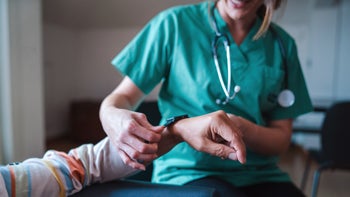GoodRx Guide
Mental Health: Your GoodRx Guide
What is mental health?
When we talk about mental health, it’s often about getting help for your struggles. And for good reason: An estimated 50% of people will have a mental illness at some point in their lives. But mental health — and having a healthy mind — isn’t just about waiting until you need help.
So what is mental health? According to the Centers for Disease Control and Prevention (CDC), mental health includes your “emotional, psychological, and social well-being.” It’s dependent on many factors. Here’s a few examples:
Feeling like you belong to a community
Meeting your basic needs like adequate food, housing, and healthcare
Finding meaning and purpose in your life
Managing stress or healing from trauma
Maintaining a healthy lifestyle through sleep, diet, and exercise
Knowing your inherited risk for mental illness
Getting support if you face discrimination like racism or transphobia
Here we’ll look at how you can work toward a healthy mind, whether you’re already doing great or feel like you need a boost.
How to have a healthy mind
Because your mental health depends on so many factors, it can be hard to know where to start if you’re trying to improve it. The good news is, there are many areas you can tap into to support a healthy mind. Some of these will probably sound familiar:
Sleep
Mindfulness
Social support
Coping skills for tough times
Hobbies and fun activities
Diet and nutrition
Exercise
To begin, consider taking an inventory. Make a list of what’s going well and what you’d like to improve. Choose one area to focus on at a time, and brainstorm small steps you can take toward your goal.
For example, you might want to try regular mindfulness meditation to reduce stress. Set the timer for just a minute each day at first. Or, maybe you want to improve your sleep schedule. Start with one change — put your phone away 30 minutes before you go to bed each day.
Small, consistent steps make a big difference when you’re building a new healthy mind habit. Enlist the help of others if you need support along the way.
Search and compare options
Resources, tips, and tools
You don’t have to go it alone as your work toward a healthier mind. There are many resources and tools available online and in-person.
For great online resources with articles to learn about mental health, check out these organizations:
Many websites and apps offer tools to track your mood, help you sleep, and more. Here are just a few of those apps:
If you’re looking for support from people who get where you’re coming from, you can try peer support groups. Search for groups, both in-person and online, here.
There are many other available mental well-being resources. Use an internet search to find relevant resources, ask friends and family for tips, or request recommendations from your healthcare provider. And don’t forget to check out all the articles below for additional tips!
Get mental health help
There may be times when you need more support for your mental health. You might notice, for example, you’re extra stressed or not like your usual self. Or maybe you’re struggling with work or your relationships. If you’re concerned, reach out to a healthcare provider.
You can start with your primary care provider or search for a mental health professional — such as a therapist, social worker, psychologist, or psychiatrist. Try these search directories:
Many providers also use telehealth apps and services to provide care. Try searching for “online therapy” or “online psychiatry” to see what your options are.
Working with a mental health professional can help you come up with new ideas to support your mental well-being. They can also provide guidance around any mental health conditions you may be experiencing. This may include therapy or medication treatments, if needed.
Common concerns
Every mental illness is different, but common signs that signal you may need more help include:
Pulling away from loved ones
Losing interest in activities you enjoy
Experiencing mood changes
Sleeping too much or too little
Feeling like you don’t have much energy
Struggling to complete your daily tasks
Noticing upsetting thoughts or behaviors
If you notice these signs, reach out to a provider to get evaluated. You can also visit Mental Health America’s screening tools to better understand your symptoms.
If you or someone you know is having an emergency, you can call the National Suicide Prevention Lifeline at 988 or text HOME to 741-741 to reach the Crisis Text Line. You can also call 911 or head to your nearest emergency room.
If you’re worried about a loved one, see this guide on how you can help during a crisis. You can also call these other hotlines:
Plenty of research shows that taking care of your mental health can support your physical well-being, too. For example, one study found that people with depression had a higher risk of developing a physical illness than those without a mental health condition. The opposite is also true. Living with a chronic illness — such as diabetes or heart disease — makes you more likely to have a mental health condition.
References
American Psychological Association. (2012). The key to making lasting lifestyle and behavioral changes: Is it will or skill?
Centers for Disease Control and Prevention. (2021). About mental health.
Kessler, R. C., et al. (2007). Lifetime prevalence and age-of-onset distributions of mental disorders in the World Health Organization's World Mental Health Survey Initiative. World Psychiatry.
Li, A., et al. (2020). Depression as a risk factor for physical illness and multimorbidity in a cohort with no prior comorbidity. Canadian Journal of Psychiatry.
Mental Health America. (2021). Take a mental health test.
Mental Health America. (2021). 31 tips to boost your mental health.
National Alliance on Mental Illness. (ND). Warning signs and symptoms.
National Institute of Mental Health. (2021). Chronic illness and mental health: recognizing and treating depression.
Richert, T. (2018). Peer support: helping others, healing yourself. National Alliance on Mental Illness.
U.S. Department of Health & Human Services. (2020). What is mental health? MentalHealth.gov.
U.S. Department of Veterans Affairs. (ND). VA app store: mental health. VA Mobile.





























